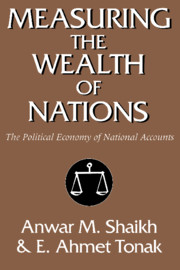Book contents
- Frontmatter
- Contents
- List of figures
- List of tables
- Preface
- 1 Introduction
- 2 Basic theoretical foundations
- 3 Marxian categories and national accounts: Money value flows
- 4 Marxian categories and national accounts: Labor value calculations
- 5 Empirical estimates of Marxian categories
- 6 A critical analysis of previous empirical studies
- 7 Summary and conclusions
- Appendices
- References
- Author index
- Subject index
2 - Basic theoretical foundations
Published online by Cambridge University Press: 09 February 2010
- Frontmatter
- Contents
- List of figures
- List of tables
- Preface
- 1 Introduction
- 2 Basic theoretical foundations
- 3 Marxian categories and national accounts: Money value flows
- 4 Marxian categories and national accounts: Labor value calculations
- 5 Empirical estimates of Marxian categories
- 6 A critical analysis of previous empirical studies
- 7 Summary and conclusions
- Appendices
- References
- Author index
- Subject index
Summary
The distinction between production and nonproduction activities
Marxist national accounts depend crucially on the distinction between labor which is productive of capital and that which is not. Because this distinction is so often presented in a confused and contradictory manner, we will not begin from it. Instead, this section will focus on the prior and more general distinction between production and nonproduction activities. The next section will then develop this into more concrete distinctions between labors which are and are not productive of capital. As we shall see, our derivation will enable us to arrive at a definition that corresponds exactly to the one Marx uses. Deriving the definition from first principles, rather than simply beginning with it, allows us to endow it with considerably greater depth.
Mistaken conceptions of the distinction
It is useful to begin by emphasizing what the distinction between production and nonproduction labor does not refer to. In the first place, it is not a distinction between necessary and unnecessary activities. We intend no connotation that production activities are either more (or less) necessary than nonproduction activities. The dividing line does not rest on either technical or social standards of efficiency, though of course such standards may well be applied to either set of activities. Baran and Sweezy's argument that some labor under capitalism would be unnecessary in a “rationally ordered” (i.e. socialist) economy (Baran 1957, p. 32) is one such efficiency approach.
- Type
- Chapter
- Information
- Measuring the Wealth of NationsThe Political Economy of National Accounts, pp. 20 - 37Publisher: Cambridge University PressPrint publication year: 1994

